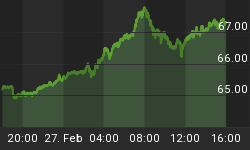Given gold's retreat during 2013, it would seem the Midas Metal's best days are behind it, at least for a while.
But nothing is further from the truth. The strong demand for gold has not gone away.
International investors, central banks and corporations are all looking to buy gold and these low Summer months are likely providing the best price.
Asian investors, especially in China and India, are buying coins and bullion like mad. Sales are up 22% annually in China and 52% in India.
Gold analyst Jim Willie said it best when he said, "The migration of gold from West to East is the grand story of the decade." They know, as our dear friend Richard Russell recently reminded us, that gold and international power still go hand in hand.
Beyond the obvious demand, history is also on gold's side. Gold's movements are in line with historic trends, never mind what the no-nothing, hand-wringing Cassandra's are saying.
A Unique Moment in History
Never has there been a time in the past when central bank policies so obviously determined market movements. And this past month provided an extreme example.
The ongoing tapering talk pushed gold down sharply because the market believes if the Fed stops stimulating the economy, an inflationary outcome is unlikely, especially if it's combined with higher interest rates boosting the dollar. All of this is bad for gold.
What's more, there may be darker forces at work as well. There's a distinct possibility the gold market is being manipulated by central bankers - again. The most recent example was a few months ago when Germany demanded the immediate repatriation of its gold, but then it quietly accepted a seven-year delivery plan. There have been too many similar incidents in recent months to pass them off as chance.
Manipulation was blamed on the central bankers back in the 1970s, and it's still the same. Only this time more central bankers and more powerful groups have joined in as well.
Nothing material really changed to justify a $700 drop in gold prices from over $1903 in 2011 to almost $1200 earlier this month. This 36% fall is clearly the steepest in gold's 12-year bull market. The worst dip prior to this was an almost 30% decline in 2008.
Gold's 8-Year Cycle: On track
But looking at gold's full bull market rise from 2001 to 2011, gold gained over 660%, so a 36% decline isn't bad from that perspective.
The fact is, if you got into the bull market early, even up until mid-2010, you're fine. But if you bought anytime after mid-2010, you are break-even to down.
But even if you're down, it's just a matter of time before we see higher gold prices, so it's imperative you keep a core position.
Gold has had a consistent low area nearly every 8 years. You can see below, it's been pretty reliable by several months. February 2001 saw an 8-year low, following a modest gold rise in 1996. Gold then rose sharply until it fell to the next low in Nov 2008, which was just three months shy of the 8-year mark.
This bring us to today... gold is now almost 5 years closer to the next major 8-year low. This doesn't mean gold is going down until then. It's simply saying that 2015 or early 2016 is a likely time period for the next key low in gold.
There are always important major rises in-between the lows. During major bull markets, gold tends to stay above the high reached prior to the 8-year low area. In today's case, this means gold should stay above the $1000 high of 2008, where the blue horizontal line and the 2001 uptrend meet.

For now, so far, so good. Gold held above the $1200 level and it's now showing the first signs of renewed strength by staying above $1275. And since gold is currently rising from an extremely oversold area, there's a good chance it will break through its next important resistance at $1350.
If so, it'll be a good sign the decline is over and the price is indeed headed higher.















